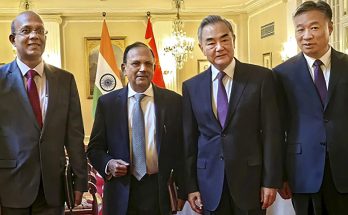 China has unveiled a series of draconian rules to limit dissent in the country by targeting popular messaging apps. With instant messaging services like WeChat becoming the go-to platform for discussion and debate, especially among the young and restless, the Chinese authorities are leaving nothing to chance. Ironically, the new curbs are being packaged as promoting “true freedom of speech.”
China has unveiled a series of draconian rules to limit dissent in the country by targeting popular messaging apps. With instant messaging services like WeChat becoming the go-to platform for discussion and debate, especially among the young and restless, the Chinese authorities are leaving nothing to chance. Ironically, the new curbs are being packaged as promoting “true freedom of speech.”
According to new rules, users will have to verify their identity with providers and sign an agreement to act within the “seven bottom lines.” As defined by the Communist Party of China (CPC), these are: “the law, the socialist system, the nation’s interests, citizens’ rights, public order, social morals and authenticity of information.”
The new diktats require that bloggers obtain permission before they publish political news, thereby shrinking space for independent voices and opinions. In a move that reinforces the government’s ‘Big Brother’ image, posting and sharing political news through public accounts has now been solely restricted to news organisations and authorized websites. Violations of the rules will result in either a warning or restrictions from posting content, or in the case of a severe violation, removal of the public account. Beijing has justified these restrictions, saying they are being instituted to “help build a clean cyberspace” and to safeguard national security.
The latest regulations appear to be targeting services like ‘Sina Weibo’- China’s hugely popular version of Twitter, and the messaging app ‘WeChat,’ both of which have millions of followers. A large number of foreign messaging apps have also been blocked in the country. Media reports point out that the messaging apps ‘KakaoTalk’ and ‘Line-both’ – both of which are owned by South Korean firms – have also been blocked.
According to the South Korean authorities, the Chinese officials have justified their decision to block the websites as being anti-terrorism measures. The state-owned Chinese media has not commented on it.
In a puzzling move, Tencent — the Chinese Internet giant behind ‘WeChat’– said it supported the new regulations. Tencent has shut down 100 public accounts and deleted close to 5,000 articles on WeChat that were considered to be circulating rumours. The company is also introducing new systems to block harmful content and spam on the app.
“We have conducted extensive research, and found that the regulations mainly intend to stop rumours and harmful information from spreading on the Internet,” the company said in an online posting.
Beijing has always sought to stifle internet freedom, and will not consider using servers of foreign internet sites as they are located outside China and are difficult to monitor. In November, the government said that the messaging apps were a potential threat to national stability because they were the main channel for the rapid spread of information. Zhang Lifan, a prominent historian and blogger in Beijing, indicated that the lack of specifics in the law have given the authorities unlimited powers, allowing them to interpret the regulations in any manner suitable to them.
Qiao Mu, a professor of journalism at Beijing Foreign Studies University, has suggested that countering terrorism might not be Beijing’s real motive. “This alleged link between terrorism and these messaging apps is pretty far-fetched. On the whole, it sounds like they are using anti-terrorism as an excuse to ban foreign apps, which are harder for the government to control.”
China-watchers say the new censorship laws have dashed any hope of political reform in China under the Xi Jinping leadership. Instead of setting new trends, the new government is following the classic Communist method of consolidating power by curtailing the basic freedom of speech and expression.
Author Profile
- India Writes Network (www.indiawrites.org) is an emerging think tank and a media-publishing company focused on international affairs & the India Story. Centre for Global India Insights is the research arm of India Writes Network. To subscribe to India and the World, write to editor@indiawrites.org. A venture of TGII Media Private Limited, a leading media, publishing and consultancy company, IWN has carved a niche for balanced and exhaustive reporting and analysis of international affairs. Eminent personalities, politicians, diplomats, authors, strategy gurus and news-makers have contributed to India Writes Network, as also “India and the World,” a magazine focused on global affairs.
Latest entries
 India and the WorldJune 26, 2025Operation Sindoor: India Sheds Restraint, Rediscovers Utility of Force
India and the WorldJune 26, 2025Operation Sindoor: India Sheds Restraint, Rediscovers Utility of Force India and the WorldJune 23, 2025BRICS summit in Rio to focus on Global South, local currency trade
India and the WorldJune 23, 2025BRICS summit in Rio to focus on Global South, local currency trade Africa InsightsJune 11, 2025New Opportunities in India-Japan Cooperation in Africa
Africa InsightsJune 11, 2025New Opportunities in India-Japan Cooperation in Africa India and the WorldMay 23, 2025Post-Operation Sindoor, India reminds Turkey, China of concerns and sensitivities
India and the WorldMay 23, 2025Post-Operation Sindoor, India reminds Turkey, China of concerns and sensitivities







